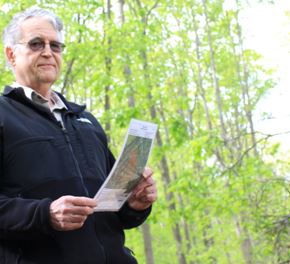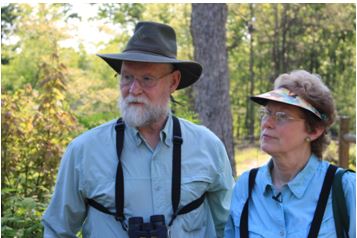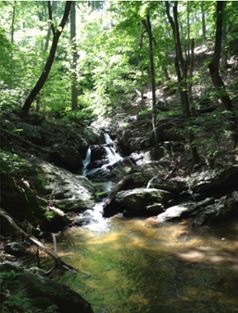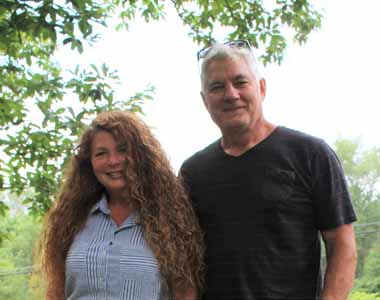The AMJV works with NRCS and other partners to promote management for priority species, such as Cerulean Warbler and Golden-winged Warbler, on private lands through regional habitat initiatives.
Cerulean Warbler Appalachian Forestland Enhancement Project
In January 2015, the AMJV partnership received an $8 million grant to enhance private forests as part of the USDA Regional Conservation Partnership Program (RCPP). The RCPP promotes coordination between the Natural Resources Conservation Service (NRCS) and its partners to deliver high-impact conservation assistance to producers and landowners. The five-year project allowed the AMJV and our partners to work with private landowners to implement active forest management to improve 12,500 acres of forest habitat and 1,000 acres of reclaimed mine lands for Cerulean Warblers and other wildlife in West Virginia, Pennsylvania, Kentucky, Ohio, and Maryland.
"This project is creating a tremendous opportunity for our partnership to engage private landowners and promote contiguous areas of viable working forests to help ensure long-term conservation of Cerulean Warblers," said Todd Fearer, Appalachian Mountains Joint Venture Coordinator. "Cerulean Warblers are one of our partnership's highest priority species and approximately 75 percent of their distribution occurs on private land. Sustainable forestry practices on private lands can improve the habitat for Cerulean Warblers and multiple other game and non-game species, while enhancing forest health."
Although the RCPP grant has included, USDA funding through the Environmental Quality Incentives Program (EQIP) is still available for landowners interested in improving mature forest habitat or restoring surface mine areas on their lands. Forest management to improve Cerulean Warbler habitat often includes thinning the forest by removing low-quality trees and using herbicides to control undesirable or invasive plants on the forest floor. The same habitat benefits deer, turkey, and many other songbirds. EQIP funding can cover much of the project costs but typically do not pay for all of the project costs. Funding is not guaranteed, but is based upon availability and environmental benefit/need.
For more about forest management for Cerulean Warblers: Cerulean Warbler Management Guidelines for Appalachian Hardwood Forests
To learn more about participating in this program in your area:
MARYLAND
Shannon Farrell
Partner Forester
WLFW - Golden-winged Warbler program/NRCS
Office: (240) 609-3505
Cell: (240) 979-8061
Visit the MD NRCS website
WEST VIRGINIA
Northern West Virginia
Jane Capozzelli
Cerulean Warbler Partner Biologist
West Virginia DNR/NRCS
(304) 363-8861
Email Jane Capozzelli
Visit the WV NRCS website
Southern West Virginia
Daniel Rubianto
Cerulean Warbler Partner Biologist
West Virginia DNR/NRCS
(304) 618-6124
Email Daniel Rubianto
Visit the WV NRCS website
Partners contributing to the Cerulean Warbler Habitat Forestland Enhancement Project include: American Bird Conservancy, Appalachian Regional Reforestation Initiative/Green Forests Work, Indiana University of Pennsylvania-Research Institute, KY Department of Agriculture State Apiarist, KY Department of Fish and Wildlife Resources, MD Department of Natural Resources Forest Service, National Wild Turkey Federation, Office of Surface Mining, Reclamation, and Enforcement, Ohio Division of Forestry, PA Dept. of Conservation and Natural Resources Bureau of Forestry, PA Game Commission, The American Chestnut Foundation, The Nature Conservancy, U.S. Fish and Wildlife Service, University of Kentucky, WV Division of Natural Resources, WV Division of Forestry, West Virginia University.
Working Lands for Wildlife for Golden-winged Warblers
Working Lands for Wildlife uses a voluntary, innovative approach to benefit high-priority habitat for seven species that are either declining, candidates for listing, or listed under the Endangered Species Act. By working with conservation partners, private landowners can receive technical and financial assistance to voluntarily restore and improve habitat on their land. One of the species in this initiative is the Golden-winged Warbler, and NRCS and AMJV partners are providing technical and financial assistance to private landowners to enhance habitat on their property to benefit Golden-winged Warblers. Assistance is available to private landowners in Georgia, Maryland, New Jersey, New York, North Carolina, Pennsylvania, Tennessee, Virginia, and West Virginia.
Golden-winged Warblers spend much of their time in young forests and old field succession environments. Young forests are habitats emerging after storm damage or a timber harvest while old field succession results from the abandonment of a farm. The abundance and quality of these habitats has declined drastically over the last century. We are working with our partners to protect and restore young forests in key areas through active forest management and restoration practices and then maintaining this environment in perpetuity. This will supply the greatest benefit to these priority bird populations as well as provide critical habitat for other birds of concern, like the Prairie Warbler and Whip-poor-will.
For more information about this initiative, visit the NRCS Golden-winged Warbler Initiative page.
State Contacts (where available):
MARYLAND
Shannon Farrell
Private Lands Forester
Allegany Field Service Center
12407 Naves Cross Road NE
Cumberland, MD 21502-6805
Office: 240-609-3505
Cell: 240-979-8061
Email Shannon Farrell
NORTH CAROLINA
Aimee Tomcho
Conservation Biologist
Audubon North Carolina
P.O. Box 1544
Burnsville, NC 28714
(828) 419-0890
Email Aimee Tomcho
PENNSYLVANIA
Emily C. Heggenstaller
Golden-winged Warbler Biologist
216 Spring Run Road, Room 102
Mill Hall, PA 17751
Email Emily Heggenstaller
VIRGINIA
Justin Folks
Private Lands Wildlife Biologist
CMI-VT/USDA-NRCS/VDGIF
Northwestern VA Conservation Office
70 Dick Huff Ln
Verona, VA 24482
(540) 248-6218 ext. 108
Email Justin Folks
Andrew Rosenberger
Private Lands Biologist
CMI-VT/USDA-NRCS/VDGIF
SW Virginia
(540) 381-4221 ext. 128
Email Andrew Rosenberger
WEST VIRGINIA
Jessica Mehta
Golden-winged Warbler Partner Biologist
West Virginia DNR/NRCS
(304) 427-3006
Email Jessica Mehta
Private Lands Partnerships in Action
Meet three landowners who have worked with the AMJV to manage their woods to improve wildlife habitat through the Cerulean Warbler Appalachian Forestland Enhancement Project and Working Lands for Wildlife program:

A fifth generation landowner in PA, John Hoover works with the AMJV and NRCS to improve wildlife habitat and manage his property for a variety of age classes. Photo: NRCS.
Read Story
The Jacksons are bringing active management back to the forest, using a variety of sustainable forestry practices to manage for patches of young forest that the golden-winged warblers need. Photo: NRCS.
Read Story
West Virginia landowner John Gavitt is using a variety of conservation practices to improve his land for wildlife, including the declining cerulean warbler. Photo: John Gavitt.
Read Story
A West Virginia community manages their landscape for healthier, more resilient forest.
Read Story
These Huntingdon county PA landowners are working to improve the healthy, structurally diverse forests that provide many benefits for wildlife.
Read StoryAppalachian Mountains Joint Venture
1700 Kraft Drive, Suite 1375
Blacksburg, VA 24060
Office: (540) 951-9376
© 2019 Appalachian Mountains Joint Venture Funded by: AMJV Partners Website by Skyhound Internet
